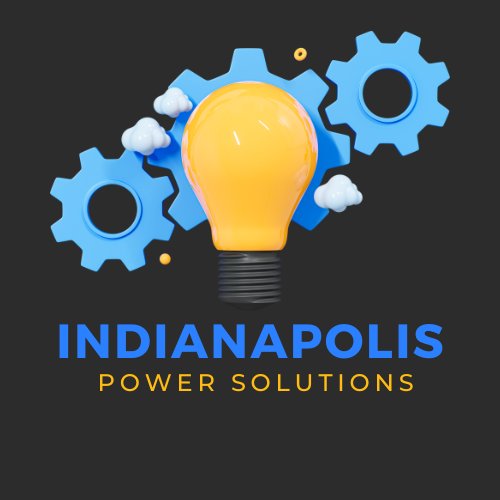
Whole House Generators in Mount Jackson IN
When it comes to keeping your home powered during unexpected outages, a whole house generator can be a game-changer. It is a backup power system designed to automatically provide electricity to your entire home during a power outage. Unlike smaller portable generators, a whole house generator is permanently installed and connected to your home’s electrical system. It kicks in within seconds of a power failure, ensuring that all your appliances, lights, and systems stay operational without interruption. Whole house generators come in various types to suit different needs:
- Standby Generators: These are the most common type of whole house generators. They are permanently installed outside your home and are powered by natural gas or propane. They automatically turn on when they detect a power outage.
- Air-Cooled Generators: Ideal for smaller homes, these generators use air to cool the engine. They are cost-effective but may not be suitable for larger properties with higher power demands.
- Liquid-Cooled Generators: These are more powerful and suitable for larger homes. They use a liquid cooling system, which allows them to handle heavier loads without overheating.
- Diesel Generators: These generators use diesel fuel, providing reliable power, especially in rural areas where natural gas may not be available. They are known for their durability and efficiency.
How It Differs from Portable Generators
Whole house generators differ significantly from portable generators. A portable generator is a smaller, often gas-powered unit that can be moved around and manually connected to essential appliances. While portable generators are useful for short-term or emergency use, they typically provide limited power, meaning only a few selected appliances can be powered at one time.
In contrast, whole house generators are permanently installed and connected to your home’s electrical system. They provide enough power to run your entire home, including all major appliances, HVAC systems, and lights. Additionally, whole house generators start automatically during a power outage, whereas portable generators must be manually started and connected.
Professional Installation vs. DIY
Installing a whole house generator is a complex process that involves electrical work, fuel line connections, and ensuring the system meets local codes and safety standards. While DIY installation might seem tempting, it’s often not recommended unless you have extensive experience with electrical systems and generator setups.

We will get back to you as soon as possible.
Please try again later.
Professional Installation: Hiring a professional ensures that your generator is installed correctly and safely. Professionals can handle all the necessary permits, connect the generator to your home’s electrical and fuel systems, and perform testing to ensure everything works seamlessly.
DIY Installation: For those with advanced DIY skills, installing a generator could be an option. However, the risks include improper installation, voiding the generator’s warranty, and even potential safety hazards. It’s crucial to understand the local codes and regulations before attempting a DIY installation.
Maintenance and Troubleshooting
Regular maintenance is essential to keep your whole house generator in top condition. Here are some key maintenance tasks:
- Regular Inspections: Check the generator for any signs of wear, leaks, or corrosion. Make sure all connections are secure.
- Oil Changes: Just like a car engine, generators need regular oil changes to keep the engine running smoothly. Follow the manufacturer’s recommendations for the frequency of oil changes.
- Battery Checks: The battery powers the generator's control panel. Regularly inspect and test the battery to ensure it’s fully charged and functioning.
- Air Filter Replacement: A clean air filter is vital for the generator’s performance. Replace the air filter as needed to prevent dust and debris from clogging the system.
- Troubleshooting: If your generator doesn’t start during a power outage or shows warning signs, it may require troubleshooting. Common issues include battery problems, fuel supply issues, or a tripped breaker. Professional technicians can diagnose and fix these problems quickly.
Long-term Savings and Investment Value
Investing in a whole house generator offers long-term savings and value in several ways:
- Prevents Losses: During a power outage, a generator can prevent losses from spoiled food, frozen pipes, and damaged electronics. This can save you money on repairs and replacements.
- Increases Property Value: A whole house generator can be a selling point for potential buyers, increasing the value of your home. Homes with reliable backup power systems are often more attractive in the real estate market.
- Energy Efficiency: Modern whole house generators are designed to be energy-efficient, reducing fuel consumption and operational costs over time.
- Peace of Mind: Knowing that your home will always have power, regardless of the weather or other factors, offers peace of mind and a sense of security.
What Are the Benefits?
Installing a whole house generator comes with a range of benefits:
- Uninterrupted Power Supply: Your entire home remains powered, ensuring comfort and safety during outages.
- Automatic Operation: The generator automatically detects power outages and starts up within seconds, without any manual intervention required.
- Safety: Whole house generators reduce the risk of accidents associated with using portable generators, such as carbon monoxide poisoning and fire hazards.
- Convenience: You don’t need to worry about refueling or moving the generator around, as it’s permanently installed and connected to a fuel source.
- Protection for Home Systems: A generator keeps critical systems like heating, cooling, and security systems running, protecting your home from damage during extended outages.
What We Offer
We provide top-of-the-line whole house generator solutions in Mount Jackson, IN. Our services include:
- Residential Generators
- Commercial Generators
- Portable Generators
- Electric Generators
- Propane Generators
- Solar Generators
- Generator Repairs
- Generator Maintenance
- Generator Parts
How to Choose the Right Generator for Your House
Choosing the right generator depends on several factors:
- Power Requirements: Consider the size of your home and the amount of power needed to run all your essential appliances and systems. Larger homes may require more powerful generators.
- Fuel Type: Decide whether you prefer a generator that runs on natural gas, propane, diesel, or a combination. Each fuel type has its advantages and considerations.
- Noise Levels: Some generators are quieter than others. If noise is a concern, look for models designed to operate quietly.
- Budget: Determine your budget and explore financing options if needed. While whole house generators are an investment, the benefits often outweigh the costs.
- Brand Reputation: Research generator brands to find one known for reliability, durability, and good customer support.
Importance of Reliable Power in Homes
Reliable power is essential for maintaining comfort, safety, and security in your home. In Mount Jackson, IN, where weather conditions can be unpredictable, having a dependable power source ensures that you’re prepared for any situation. A whole house generator provides the assurance that your home will remain functional and safe, even during extended power outages. Whether it’s keeping your HVAC system running in extreme temperatures, powering medical equipment, or ensuring your security system stays active, reliable power is a necessity, not a luxury.
Frequently Asked Questions (FAQs)
1. How long does it take to install a whole house generator?
The installation process typically takes one to two days, depending on the complexity of the setup and any additional work required.
2. How often should I service my generator?
It’s recommended to service your generator at least once a year or after every 200 hours of use, whichever comes first.
3. Can a whole house generator run on multiple fuel types?
Some models are dual-fuel, meaning they can run on either natural gas or propane, giving you flexibility depending on your fuel availability.
4. Is a whole house generator safe to use?
Yes, when installed correctly, whole house generators are safe. They are designed to operate automatically and have safety features like automatic shut-off if an issue arises.
5. What size generator do I need?
The size of the generator depends on your home’s power needs. A professional assessment can help determine the right size for your home.
Ready to invest in a whole house generator in Mount Jackson, IN? Contact us today to schedule a consultation. Our team is here to help you choose the best generator for your needs and ensure a seamless installation process. Don’t wait until the next power outage—secure your home’s power supply today!
Let's Connect!
Ensure your home stays powered. Our whole house generators are your best defense against unexpected outages, keeping your family safe and comfortable. Discover how whole house generators work and why they're crucial for your home. Check out our buyer's guide to find the perfect fit for your needs and protect against the common reasons for loss of power. Contact us now!